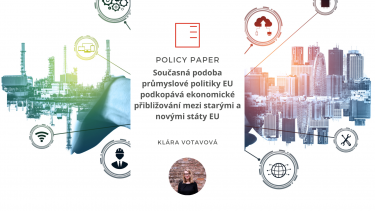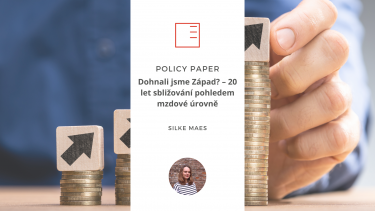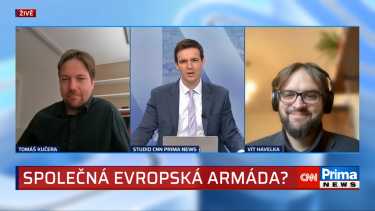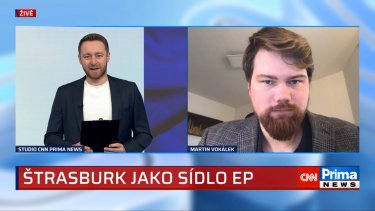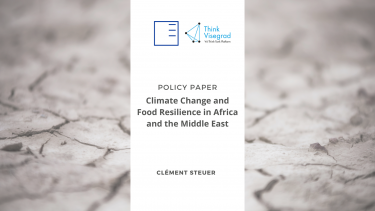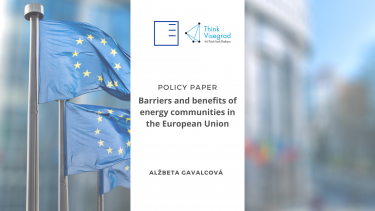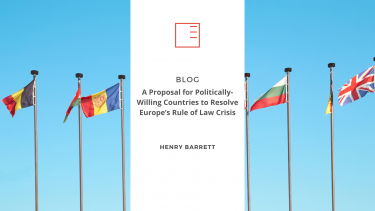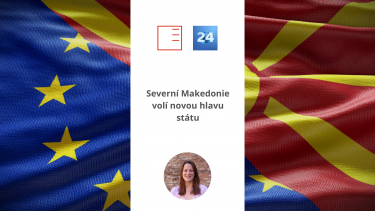Policy paper | Current EU industrial policy undermines economic convergence between old and new EU countries
The post-communist states of Central and Eastern Europe, including the Czech Republic, joined the European Union at the height of globalisation and the dominance of the so-called Washington Consensus policies. However, the global economic crisis of 2008 showed shortly afterwards that these policies had their limits. Read more in Klára Votavová's Policy Pepeu.
Show morePolicy paper | Dohnali jsme Západ? – 20 let sbližování pohledem mzdové úrovně
Letos si EU připomíná výročí největší vlny rozšiřování v historii, kdy do Unie vstoupila Česká republika spolu s dalšími devíti zeměmi střední a východní Evropy. Jedním z hlavních slibů spojeným s rozšířením přitom bylo, že nové členské státy doženou západní Evropu v životní úrovni. Více se dočtete v policy paperu Silke Maes.
Show moreCNN Prima News | The European Army and the position of the Defense Commissioner
The next European Commission should have a new Commissioner for Defense. There is speculation that this position could go to the Czech Republic. However, some European politicians, such as French President Emmanuel Macron, are calling directly for the creation of European army. But what are the pitfalls of the project? Vít Havelka, a research fellow at EUROPEUM Institute, talked about the usefulness and possibilities for CNN Prima News.
Show more
CNN Prima News | Jednotná evropská armáda a pozice komisaře pro obranu
Příští Evropská komise by měla mít nový post komisaře pro obranu. Spekuluje se o tom, že by tato pozice mohla připadnout Česku. Někteří evropští politici, jako například francouzský prezident Emmanuel Macron, však volají přímo po vytvoření společné evropské armády. Jaká úskalí ale projekt má? O jeho užitečnosti a možnostech mluvil pro CNN Prima News Vít Havelka, výzkumný pracovník Institutu EUROPEUM.
Show more
CNN Prima News | Two plenary session locations of the European Parliament
The MEPs discussed the difficulty of changing the seat of the European Parliament, which periodically moves from Belgium to France. Most agreed that they would welcome if this movement was canceled. However, France would probably veto such a change in the treaties. What are the arguments for and against moving the European Parliament periodically? Is there any way out of this problem, or will Strasbourg's role remain the same for decades to come? Martin Vokálek, Director of EUROPEUM Institute for European Policy, commented for CNN Prima News on the issue.
Show more
Policy Paper | Climate Change and Food Resilience in Africa and the Middle East
Russia's war in Ukraine has destabilised supply chains and strained food systems in Africa and the Middle East, highlighting their vulnerability and the need to increase their resilience. Writes Clément Steuer, Senior Research Fellow at the Institute of International Relations Prague.
Show morePolicy Paper | Barriers and benefits of energy communities in the European Union
Energy communities are an effective means to decentralize and renew our energy systems with sustainable solutions as they are usually based on renewable energy. They have already started emerging in 1970´s, yet there has been a significant increase in their development only in recent years, also in terms of their introduction into the EU legislation. Especially in Western and Northern European countries the concept already enjoys vast popularity. On the other hand, in Central and Eastern European countries (further referred to as CEE) energy communities are only beginning to emerge. The policy brief (based on literature and interviews with various stakeholders ) examines the benefits energy communities may bring, and more importantly, the main obstacles remaining in their way for greater evolution in the CEE region – and especially Visegrad countries (V4). As these initiatives progress, sharing the best practices will ensure the success of the community energy in the energy transition. Writes Alžbeta Gavalcová.
Show moreBLOG | A Proposal for Politically-Willing Countries to Resolve Europe’s Rule of Law Crisis
Given the lack of adequate EU responses over rule of law violations, politically-willing European states ought to consider a novel accountability mechanism. It is high time for committed European states to take innovative and decisive action on more than a decade of democratic backsliding sweeping the region and the world. Should European Union Member States concerned about rule of law violations seek a solution outside the EU institutions? Our researcher Henry Barrett, a Fulbright-Schuman Grantee, writes about this topic in his blog.
Show moreBLOG | Jak vyřešit krizi právního státu v Evropě?
Vzhledem k nedostatečné reakci EU na porušování zásad právního státu by evropské státy, které k tomu mají politické důvody, měly zvážit zavedení nového mechanismu odpovědnosti. Je nejvyšší čas, aby evropské státy přijaly inovativní a rozhodné kroky v souvislosti s více než desetiletým úpadkem demokracie, který zasáhl nejen Evropu, ale i celý svět. Měly by členské státy Evropské unie, znepokojené porušováním zásad právního státu, hledat řešení mimo orgány EU? O tématu píše ve svém blogu náš výzkumník v rámci Fulbright-Schumanova grantu Henry Barrett.
Show moreČT24 | Northern Macedonia elects new head of state
Polls opened in North Macedonia on Wednesday for the first round of the presidential elections. Seven candidates are running for the presidency in a country gripped by political tensions, disappointment with democratic reforms and aspirations to join the European Union. Jana Juzová, a senior researcher at EUROPEUM Institute, analysed the situation in an interview for ČT24.
Show moreStaroměstské náměstí 4/1
Prague 1 - Staré Město
110 00
tel.: +420 212 246 552
email: europeum@europeum.org
https://www.europeum.org
